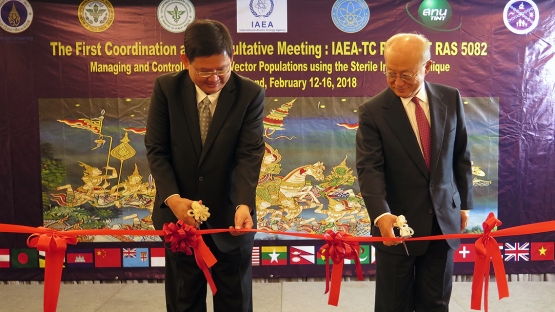IAEA Director General Yukiya Amano visited Bangkok, Thailand this week, where in his meetings with senior officials he discussed a range of development areas where nuclear applications play a vital role. These included the Sterile Insect Technique (SIT) that can help to control the Aedes mosquito population and the role of nuclear medicine in the health sector.
In his opening remarks at the first coordination and consultative meeting for a new four-year project on using the SIT to control the Aedes mosquito population, ‘Managing and Controlling Aedes Vector Populations Using the Sterile Insect Technique,’ Mr Amano said that the technique has proved effective against a number of insect pests which are harmful to human beings, animals or food crops. “IAEA Member States around the world have used the technique successfully against fruit flies and tsetse flies. Important progress has been made in its use against mosquitoes,” he said, adding that vector-borne diseases such as dengue, chikungunya, Zika viral disease and yellow fever are becoming important public health problems in many countries in South-east Asia.
Sixteen Asian countries are participating in the project.
Nuclear technology for development progress
At his meetings with cabinet ministers, Mr Amano noted the active and important role that Thailand plays in regional cooperation, particularly under the Regional Cooperative Agreement (RCA). This collaborative engagement helps to strengthen and expand the contribution of nuclear science and technology to socioeconomic development in different regions.
Mr Amano met with Minister for Foreign Affairs, Don Pramudwinai, and Minister of Science and Technology, Suvit Maesincee.
During these discussions, Mr Amano drew attention to the IAEA’s continued support towards enhancing Thailand’s implementation of peaceful nuclear applications, including in the areas of diagnostic radiology, nuclear medicine and radiotherapy, emergency preparedness and response, establishing a multipurpose radiation technology centre, food safety, and building research reactor capacities.
Minister Maesincee and Mr Amano also discussed the IAEA assistance in capacity-building for the setting up of the new Biodosimetry and Nuclear Forensics Laboratory under the Office of Atoms for Peace in the Ministry of Science and Technology.
Other issues addressed included the prospects for introducing nuclear power in the country’s energy mix, and the Nuclear Energy Peace Act passed by Thailand’s national legislative assembly in May 2016 that sets out regulations for the management of nuclear related activities and radioactive material. This Act also mandates the setting up of a new body, the Nuclear Energy for Peace Commission, to oversee the country’s nuclear energy policy and procedure, monitor compliance with the Act and advise on nuclear safety, Mr Amano was informed.
Mr Amano was in Thailand from 10 to 12 February, in the last leg of his three country Asia tour, having visited Indonesia and the Philippines last week.






